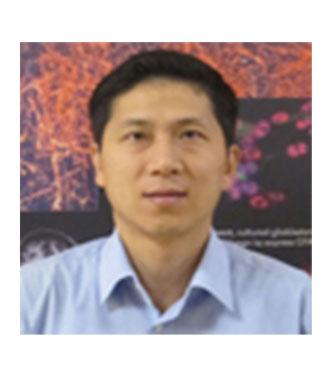Mingyao
Ying
,
PhD
Breadcrumb
Home Patient Care Faculty & Leadership Mingyao Ying, PhD
707 N. Broadway, Room 424
Baltimore, MD 21205
United States
About
Dr. Mingyao Ying is an associate professor in the Department of Neurology at Kennedy Krieger Institute and The Johns Hopkins University School of Medicine.
Education
Dr. Ying received his Ph.D. degree from Fudan University in China for research on neurodegenerative diseases. He completed post-doctoral research on Parkinson’s disease with Dr. Ted Dawson at the Johns Hopkins University School of Medicine and most recently on transcriptional regulation of brain tumor stem cells with Dr. John Laterra at the Kennedy Krieger Institute.
Research
Dr. Ying received his scientific training in the field of neurodegenerative diseases and brain tumors. His research interests focus on identifying new targets that regulate the self-renewal and differentiation of normal and malignant stem cells. He was first to show that mutant transcription factor, Atrophin-1, induces transcription deregulation and neurodegenerative phenotypes in a mouse model of Dentatorubral-pallidoluysian atrophy, which can be ameliorated by histone deacetylase inhibitor. As a postdoctoral fellow in Johns Hopkins School of Medicine, Dr. Ying studied the molecular mechanism of neurodegenerative diseases and established a new mouse model of Parkinson’s disease.
After joining the neuro-oncology laboratory in Kennedy Krieger Research Institute, Dr. Ying’s research has increasingly focused on the functions of multiple transcription factors in human brain tumor stem cells. Dr. Ying has published his research identifying a novel transcription factor, krupple-like factor 9, which can differentiate brain tumor stem cells, inhibit their tumor propagation, and inhibit Notch signaling in these cells. He has developed a transcription-factor-based differentiation strategy for efficiently generating functional and transplantable dopaminergic neurons from human pluripotent stem cells. His current research focuses on identifying transcription factors with potential applications in regenerative medicine and cancer therapeutics.
Related Links
Google Scholar Profile
Research Publications
Zou L, Xue Y, Jones M, Heinbockel T, Ying M, Zhan X (2017). The Effects of Quinine on Neurophysiological Properties of Dopaminergic Neurons. Neurotox Res. , .
Wan J, Su Y, Song Q, Tung B, Oyinlade O, Liu S, Ying M, Ming GL, Song H, Qian J, Zhu H, Xia S (2017). Methylated <i>cis</i>-regulatory elements mediate KLF4-dependent gene transactivation and cell migration. Elife. 6, .
